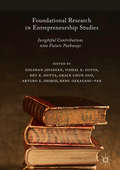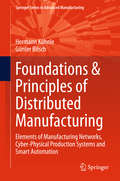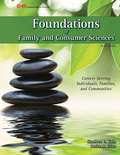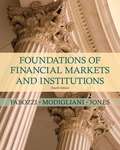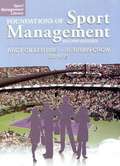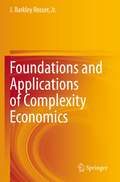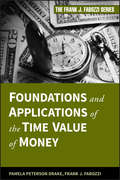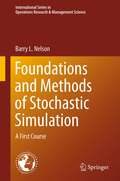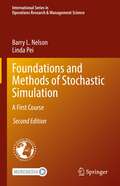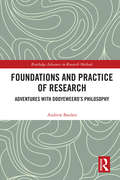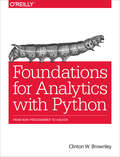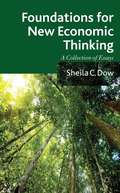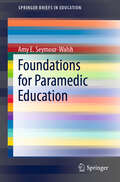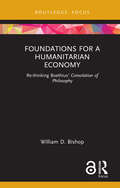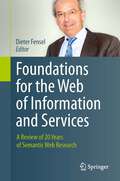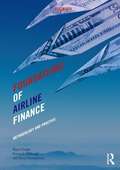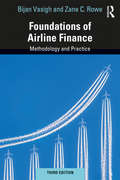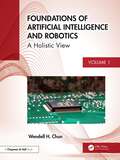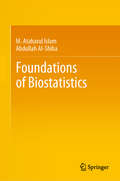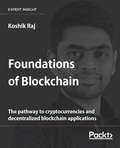- Table View
- List View
Foundation for Integrating Employee Health Activities for Active Duty Personnel in the Department of Defense
by Christopher Nelson Elizabeth M. Sloss Gary Cecchine Gail Fisher Preethi R. SamaThe authors describe current Department of Defense safety and occupational health programs and health information systems, as well as employee health programs outside of DoD to provide a foundation for considering a more integrated Department of Defense employee health program.
Foundational Research in Entrepreneurship Studies: Insightful Contributions And Future Pathways
by Golshan Javadian Vishal K. Gupta Dev K. Dutta Grace Chun Guo Arturo E. Osorio Banu Ozkazanc-PanThis book draws attention to the classic, seminal articles in entrepreneurship that have made profound contributions to the field’s emergence, development, and maturity. In each chapter, a classic is identified, ideas contained therein that are still relevant to the field are discussed, and subsequently follow-up research that is being conducted based on these ideas is highlighted, including possible areas of future research. Scholars will embrace this systematic effort to identify and reveal the contribution of classic articles in entrepreneurship research and their impact on subsequent scholarship.
Foundations & Principles of Distributed Manufacturing
by Hermann Kühnle Günter BitschThe book presents a coherent description of distributed manufacturing, providing a solid base for further research on the subject as well as smart implementations in companies. It provides a guide for those researching and working in a range of fields, such as smart manufacturing, cloud computing, RFID tracking, distributed automation, cyber physical production and global design anywhere, manufacture anywhere solutions. Foundations & Principles of Distributed Manufacturing anticipates future advances in the fields of embedded systems, the Internet of Things and cyber physical systems, outlining how adopting these innovations could rapidly bring about improvements in key performance indicators, which could in turn generate competition pressure by rendering successful business models obsolete. In laying the groundwork for powerful theoretical models, high standards for the homogeneity and soundness of the suggested setups are applied. The book especially elaborates on the upcoming competition in online manufacturing operations and respective control procedures. By outlining encapsulation and evolving decision-making principles, Foundations & Principles of Distributed Manufacturing fully conceptualizes the view of manufacturing networks as sets of loosely coupled interacting smart factory objects. Moreover, the book provides concrete approaches to a number of future fields, where distributed manufacturing might be applied. Both researchers and professionals will profit from the authors' broad experience in Distributed Manufacturing and Fractal Enterprise implementations, where they initiated and completed a number of successful research projects: within the global Intelligent Manufacturing Systems (IMS) scheme, within the European Research Area frameworks as well as national contexts, and both in industry and at leading research institutions. This background ensures well-founded theory on one hand and valuable practical results on the other in a fascinating area that is still under intensive research. Readers will acquire essential insights as well as useful guidance for categorizing and specifying extended distributed manufacturing solutions and their professional implementations.
Foundations Of Family And Consumer Sciences: Careers Serving Individuals, Families, And Communities
by Sharleen L. Kato Janice G. EliasFoundations of Family and Consumer Sciences a completely updated college-level textbook designed to introduce students to the Family and Consumer Sciences profession. An overview of the profession, including history and trends, is presented. Career opportunities for each Family and Consumer Sciences specialization area are explored and come to life in Professional Profiles and Issues in the News features. The text guides students in how to move into the workplace and make a difference in the lives of others.
Foundations Of Financial Markets And Institutions (Fourth Edition)
by Frank J. Fabozzi Frank J. Jones Franco P. ModiglianiA comprehensive exploration of the world's financial markets and institutions. Introduction; Financial Institutions, Financial Intermediaries, and Asset Management Firms; Depository Institutions: Activities and Characteristics; The U. S. Federal Reserve and the Creation of Money; Monetary Policy in the United States; Insurance Companies; Investment Companies and Exchange-Traded Funds; Pension Funds; Properties and Pricing of Financial Assets; The Level and Structure of Interest Rates; The Term Structure of Interest Rates; Risk/Return and Asset Pricing Models; Primary Markets and the Underwriting of Securities; Secondary Markets; Treasury and Agency Securities Markets; Municipal Securities Markets; Markets for Common Stock: The Basic Characteristics; Markets for Common Stock: Structure and Organization; Markets for Corporate Senior Instruments: I; Markets for Corporate Senior Instruments: II; The Markets for Bank Obligations; The Residential Mortgage Market; Residential Mortgage-Backed Securities Market; Market for Commercial Mortgage Loans and Commercial Mortgage-Backed Securities; Market for Asset-Backed Securities; Financial Futures Markets; Options Markets; Pricing of Futures and Options Contracts; The Applications of Futures and Options Contracts; OTC Interest Rate Derivatives: Forward Rate Agreements, Swaps, Caps, and Floors; Market for Credit Risk Transfer Vehicles: Credit Derivatives and Collateralized Debt Obligations; The Market for Foreign Exchange and Risk Control Instruments MARKET: Foundations of Financial Markets and Institutions, offers a comprehensive exploration of the revolutionary developments occurring in the world's financial markets and institutions -i. e. , innovation, globalization, and deregulation-with a focus on the actual practices of financial institutions, investors, and financial instruments.
Foundations Of Sport Management
by Andy Gillentine R. Brian CrowThe sport industry represents one of the largest and fastest growing industries in the United States and the world (Pitts & Stotlar, 2002; Sports Business Journal, 2003; The Sport Industry, 2007). This accelerated growth has fueled the continued desire of many people to pursue a career in the sport industry. Thousands of students each year, in the U.S. and abroad, enter academic programs specializing in the study of sport management to prepare for a future in sport.
Foundations and Applications of Complexity Economics
by J. Barkley Rosser, Jr.This book presents a survey of the aspects of economic complexity, with a focus on foundational, interdisciplinary ideas. The long-awaited follow up to his 2011 volume Complex Evolutionary Dynamics in Urban-Regional and Ecologic-Economic Systems: From Catastrophe to Chaos and Beyond, this volume draws together the threads of Rosser’s earlier work on complexity theory and its wide applications in economics and an expanded list of related disciplines. The book begins with a full account of the broader categories of complexity in economics--dynamic, computational, hierarchical, and structural--before shifting to more detailed analysis. The next two chapters address problems associated with computational complexity, especially those of computability, and discuss the Godel Incompleteness Theorem with a focus on reflexivity. The middle chapters discuss the relationship between entropy, econophysics, evolution, and economic complexity, respectively, with applications in urban and regional dynamics, ecological economics, general equilibrium theory, as well as financial market dynamics. The final chapter works to bring together these themes into a broader framework and expose some of the limits concerning analysis of deeper foundational issues.With applications in all disciplines characterized by interconnected nonlinear adaptive systems, this book is appropriate for graduate students, professors and practitioners in economics and related disciplines such as regional science, mathematics, physics, biology, environmental sciences, philosophy, and psychology.
Foundations and Applications of the Time Value of Money
by Drake Pamela Peterson Fabozzi Frank J.Comprehensive coverage of the time value of money In this book, authors Pamela Peterson Drake and Frank Fabozzi fully expand upon the type of time value of money (TVM) concepts usually presented as part of overviews given in other general finance books. Various TVM concepts and theories are discussed, with the authors offering many examples throughout each chapter that serve to reinforce the tools and techniques covered. Problems and detailed solutions-demonstrated using two different financial calculators, as well as Excel-are also provided at the end of each chapter, while glossary terms are provided in an appendix to familiarize you with basic terms. Provides the basic foundations of the time value of money Covers issues ranging from an introduction of financial mathematics to calculating present/future values and understanding loan amortization Contains problem/solution sets throughout, so you can test your knowledge of the topics discussed Understanding the time value of money is essential, and this reliable resource will help you gain a firm grasp of its many aspects and its real-world applications.
Foundations and Methods of Stochastic Simulation
by Barry NelsonThis graduate-level text covers modeling, programming and analysis of simulation experiments and provides a rigorous treatment of the foundations of simulation and why it works. It introduces object-oriented programming for simulation, covers both the probabilistic and statistical basis for simulation in a rigorous but accessible manner (providing all necessary background material); and provides a modern treatment of experiment design and analysis that goes beyond classical statistics. The book emphasizes essential foundations throughout, rather than providing a compendium of algorithms and theorems and prepares the reader to use simulation in research as well as practice. The book is a rigorous, but concise treatment, emphasizing lasting principles but also providing specific training in modeling, programming and analysis. In addition to teaching readers how to do simulation, it also prepares them to use simulation in their research; no other book does this. An online solutions manual for end of chapter exercises is also be provided.
Foundations and Methods of Stochastic Simulation: A First Course (International Series in Operations Research & Management Science #316)
by Barry L. Nelson Linda PeiThis graduate-level textbook covers modelling, programming and analysis of stochastic computer simulation experiments, including the mathematical and statistical foundations of simulation and why it works. The book is rigorous and complete, but concise and accessible, providing all necessary background material. Object-oriented programming of simulations is illustrated in Python, while the majority of the book is programming language independent. In addition to covering the foundations of simulation and simulation programming for applications, the text prepares readers to use simulation in their research. A solutions manual for end-of-chapter exercises is available for instructors.
Foundations and Practice of Research: Adventures with Dooyeweerd's Philosophy (Routledge Advances in Research Methods)
by Andrew BasdenMany of the issues on which meaningful research is founded are seldom discussed; for example, the role of everyday experience, diversity and coherence of meaning in the world, the meaningfulness and wider mandate of research, the very nature and validity of theoretical thought, and the deep presuppositions of philosophy and how they undermine the success of research. Such questions are material to the philosophies that guide research thinking in all fields, and since they cannot be satisfactorily addressed in a piecemeal fashion, this book employs the radically different philosophy of Herman Dooyeweerd to consider them together. Parts I and II discuss these issues theoretically and philosophically, while Part III discusses them practically, specifically the adventures that researchers across the world have had using Dooyeweerd's philosophy. Foundations and Practice of Research assembles a wide range of experiences of using Dooyeweerd's philosophy in research in the fields of mathematics, the natural sciences, the social sciences, design sciences and the humanities. Case studies demonstrate how Dooyeweerd's philosophy has been found fruitful in most stages of research, and the philosophical discussion backs this up. This book challenges researchers to join the adventures, including suggestions of potential research that could be carried out, as well as questions still left unanswered.
Foundations for Analytics with Python: From Non-Programmer to Hacker
by Clinton W. BrownleyIf you’re like many of Excel’s 750 million users, you want to do more with your data—like repeating similar analyses over hundreds of files, or combining data in many files for analysis at one time. This practical guide shows ambitious non-programmers how to automate and scale the processing and analysis of data in different formats—by using Python.After author Clinton Brownley takes you through Python basics, you’ll be able to write simple scripts for processing data in spreadsheets as well as databases. You’ll also learn how to use several Python modules for parsing files, grouping data, and producing statistics. No programming experience is necessary.Create and run your own Python scripts by learning basic syntaxUse Python’s csv module to read and parse CSV filesRead multiple Excel worksheets and workbooks with the xlrd modulePerform database operations in MySQL or with the mysqlclient moduleCreate Python applications to find specific records, group data, and parse text filesBuild statistical graphs and plots with matplotlib, pandas, ggplot, and seabornProduce summary statistics, and estimate regression and classification modelsSchedule your scripts to run automatically in both Windows and Mac environments
Foundations for New Economic Thinking
by Sheila C. DowNew economic thinking is in demand in the light of the recent economic crisis. This book equips the reader with a better understanding of current ways of thinking as well as an awareness of other possibilities, providing the foundations for debate in theory and methodology alongside practical implications for policy.
Foundations for Paramedic Education (SpringerBriefs in Education)
by Amy E. Seymour-WalshThis book addresses the nature of professional learning, paramedic skill development, practice assessment, and feedback from both clinical and educational theory perspectives. It provides clear guidance from the literature, learning theory, and current research to help clinical educators plan robust professional education activities that address students’ learning needs and clinical practice expectations. Based on the premise that assessment of practical skills and applied knowledge is integral to paramedic education, the book presents a worked example of a validated assessment approach. Each chapter contains realistic case studies for the array of paramedic education contexts, including simulated supervision, continuing in-service education, tertiary education and formal graduate programs. All chapters include a series of questions designed to guide both individual and group-based reflection on educational practice and philosophy.
Foundations for a Humanitarian Economy: Re-thinking Boethius’ Consolation of Philosophy (Economics and Humanities)
by William D. BishopThe modern global economy and discipline of economics place mathematical calculation above human concern. However, a re-reading of Boethius’ The Consolation of Philosophy can positively highlight the contrast in values and spirit of the early medieval European world with our own scientific age. This book discusses the historical and cultural contexts that influenced Boethius’ writing and explores how Consolation offers a radically different understanding of economic concepts: wealth from inner happiness and virtues, poverty from hoarding outer possessions, self-sufficiency in the greater whole, enlightenment through misfortune, and development as fruition from the Good. These economic considerations resonate with a range of heterodox economic perspectives, such as Ecological and Buddhist Economics. The fundamental revaluations gained through Boethius pose a critique of mainstream neoclassical and neoliberal economics: to consumerism, avarice, growth and technology fetishism, and market rationality. These economic foundations resonate into a time when global crises raise the question of fundamental human priorities, offering alternatives to an ever-expanding industrial market economy designed for profit, and helping to avoid irrevocable socio-ecological disasters. The issues raised and questioned in this book will be of significant interest to readers with concern for pluralist approaches to economics, philosophy, classics, ancient history and theology.
Foundations for a Humanitarian Economy: Re-thinking Boethius’ Consolation of Philosophy (ISSN)
by William D. BishopThe modern global economy and discipline of economics place mathematical calculation above human concern. However, a re-reading of Boethius’ The Consolation of Philosophy can positively highlight the contrast in values and spirit of the early medieval European world with our own scientific age.This book discusses the historical and cultural contexts that influenced Boethius’ writing and explores how Consolation offers a radically different understanding of economic concepts: wealth from inner happiness and virtues, poverty from hoarding outer possessions, self-sufficiency in the greater whole, enlightenment through misfortune, and development as fruition from the Good. These economic considerations resonate with a range of heterodox economic perspectives, such as Ecological and Buddhist Economics. The fundamental revaluations gained through Boethius pose a critique of mainstream neoclassical and neoliberal economics: to consumerism, avarice, growth and technology fetishism, and market rationality. These economic foundations resonate into a time when global crises raise the question of fundamental human priorities, offering alternatives to an ever-expanding industrial market economy designed for profit, and helping to avoid irrevocable socio-ecological disasters. The issues raised and questioned in this book will be of significant interest to readers with concern for pluralist approaches to economics, philosophy, classics, ancient history and theology.
Foundations for the Web of Information and Services: A Review of 20 Years of Semantic Web Research
by Dieter FenselIn the mid 1990s, Tim Berners-Lee had the idea of developing the World Wide Web into a "Semantic Web", a web of information that could be interpreted by machines in order to allow the automatic exploitation of data, which until then had to be done by humans manually. One of the first people to research topics related to the Semantic Web was Professor Rudi Studer. From the beginning, Rudi drove projects like ONTOBROKER and On-to-Knowledge, which later resulted in W3C standards such as RDF and OWL. By the late 1990s, Rudi had established a research group at the University of Karlsruhe, which later became the nucleus and breeding ground for Semantic Web research, and many of today's well-known research groups were either founded by his disciples or benefited from close cooperation with this think tank. In this book, published in celebration of Rudi's 60th birthday, many of his colleagues look back on the main research results achieved during the last 20 years. Under the editorship of Dieter Fensel, once one of Rudi's early PhD students, an impressive list of contributors and contributions has been collected, covering areas like Knowledge Management, Ontology Engineering, Service Management, and Semantic Search. Overall, this book provides an excellent overview of the state of the art in Semantic Web research, by combining historical roots with the latest results, which may finally make the dream of a "Web of knowledge, software and services" come true.
Foundations in Personal Finance (High School Edition)
by Dave RamseyThis book presents Introduction to Personal Finance and goes in detail about Saving,Budgeting ,Debt,Investing and Retirement and Insurance.
Foundations of Airline Finance: Methodology and Practice
by Bijan Vasigh Kenneth Fleming Barry HumphreysIn recent years the airline industry has experienced severe volatility in earnings, with airlines recording periods of substantial profits that are closely followed by periods of financial distress. This trend has continued into the new millennium, with numerous examples of airlines across the globe entering bankruptcy protection or liquidating. The text provides an introduction to both the basics of finance and the particular intricacies of airline finance where there can be significant fluctuations in both revenues and costs. This new edition also includes: capital budgeting management of current assets financial risk analysis fuel hedging aircraft leasing This textbook contains chapters that cover unique aspects of the aviation financial decision-making process. These include a rigorous and structured presentation of the buy versus lease decision that is prevalent in the industry, a valuation process for aviation assets, the recent trend toward privatization and the difficulty inherent in the valuation of a publicly-owned or semi-publicly owned asset. The Foundations of Airline Finance, now in its second edition, is an introductory text that can be used either as a general financial text or in a specialized class that deals with aviation finance in particular.
Foundations of Airline Finance: Methodology and Practice
by Bijan Vasigh Zane C. RoweThere are few industries that have had a more profound impact on business and society over the last century than aviation. This book is an accessible, up-to-date introduction to the current state of the aviation industry which provides readers with the tools necessary to understand the volatile and often complicated nature of airline finance. Understanding finance is critical in any industry; however, the financial track record of the airline industry places even more importance on effective financial management. Foundations of Airline Finance provides an introduction to the basics of finance – including time value of money, the valuation of assets, and revenue management – and the particular intricacies of airline finance where there can be wild fluctuations in both revenues and costs. The third edition of this text has been extensively updated to reflect the many changes in the air transport industry that have taken place since the publication of the second edition, and features an expanded chapter on aircraft leasing and many new international case examples. This thorough introduction to aviation finance is valuable reading as a general, introductory financial text, or as reading in specialized airline finance classes.
Foundations of Artificial Intelligence and Robotics: Volume 1 A Holistic View
by Wendell H. ChunArtificial intelligence (AI) is a complicated science that combines philosophy, cognitive psychology, neuroscience, mathematics and logic (logicism), economics, computer science, computability, and software. Meanwhile, robotics is an engineering field that compliments AI. There can be situations where AI can function without a robot (e.g., Turing Test) and robotics without AI (e.g., teleoperation), but in many cases, each technology requires each other to exhibit a complete system: having "smart" robots and AI being able to control its interactions (i.e., effectors) with its environment. This book provides a complete history of computing, AI, and robotics from its early development to state‑of‑the‑art technology, providing a roadmap of these complicated and constantly evolving subjects.Divided into two volumes covering the progress of symbolic logic and the explosion in learning/deep learning in natural language and perception, this first volume investigates the coming together of AI (the mind) and robotics (the body), and discusses the state of AI today.Key Features: Provides a complete overview of the topic of AI, starting with philosophy, psychology, neuroscience, and logicism, and extending to the action of the robots and AI needed for a futuristic society Provides a holistic view of AI, and touches on all the misconceptions and tangents to the technologies through taking a systematic approach Provides a glossary of terms, list of notable people, and extensive references Provides the interconnections and history of the progress of technology for over 100 years as both the hardware (Moore’s Law, GPUs) and software, i.e., generative AI, have advanced Intended as a complete reference, this book is useful to undergraduate and postgraduate students of computing, as well as the general reader. It can also be used as a textbook by course convenors. If you only had one book on AI and robotics, this set would be the first reference to acquire and learn about the theory and practice.
Foundations of Biostatistics
by M. Ataharul Islam Abdullah Al-ShihaThis book offers a comprehensive guide to essential techniques and methods in biostatistics, addressing the underlying concepts to aid in comprehension. The use of biostatistics techniques has increased manifold in the recent past, due to their suitability for applications in a wide range of problems in various fields. This book helps learners grasp the materials in detail, equipping them to use biostatistics techniques independently and confidently. The book starts with a summary of background materials, followed by methods and techniques. As such, with only minimum guidance from teachers, this book can provide materials for self-learning of biostatistics techniques with a deeper level of understanding. The first two chapters focus on fundamental concepts, sources of data, data types, organization of data, and descriptive statistics, followed by the basic probability concepts, distributions and sampling distributions needed in order to combine descriptive statistics with inferential techniques. Estimation and tests of hypotheses are illustrated in two separate chapters. Important measures of association, linear regression, analysis of variance and logistic regression, and proportional hazards models are then presented systematically, ensuring that the book covers the topics most essential to students and users of biostatistics in connection with a wide range of applications in various fields. The book has been carefully structured, and the content is presented in a sequence covering the essential background in a highly systematic manner, supporting the learning process by presenting theory and applications that complement one another.
Foundations of Blockchain: The pathway to cryptocurrencies and decentralized blockchain applications
by Koshik RajReaders should be comfortable with general security terms, but no knowledge of cryptography or decentralized application is assumed. Although the book begins with all the basic concepts, a hands-on python programming, and theoretical networking knowledge, would speed up the reading process.
Foundations of Business
by Jack R. Kapoor Robert J. Hughes William M. PrideGain the understanding of business to become a better employee, more informed consumer and even a successful business owner with Pride/Hughes/Kapoor's FOUNDATIONS OF BUSINESS, 6E. Every feature has been evaluated by experienced instructors and business students, like you. New applications and activities guide you in applying important concepts. This up-to-date edition highlights business ownership, management and organization, human resources, marketing, e-business, information systems, accounting and finance. You study ethics and social responsibility, small business and entrepreneurship and global issues. Cutting-edge content also emphasizes social media, international business, green and socially responsible business and sustainability. MindTap online resources help you further master important concepts and succeed in today's competitive business world and in your personal life.

